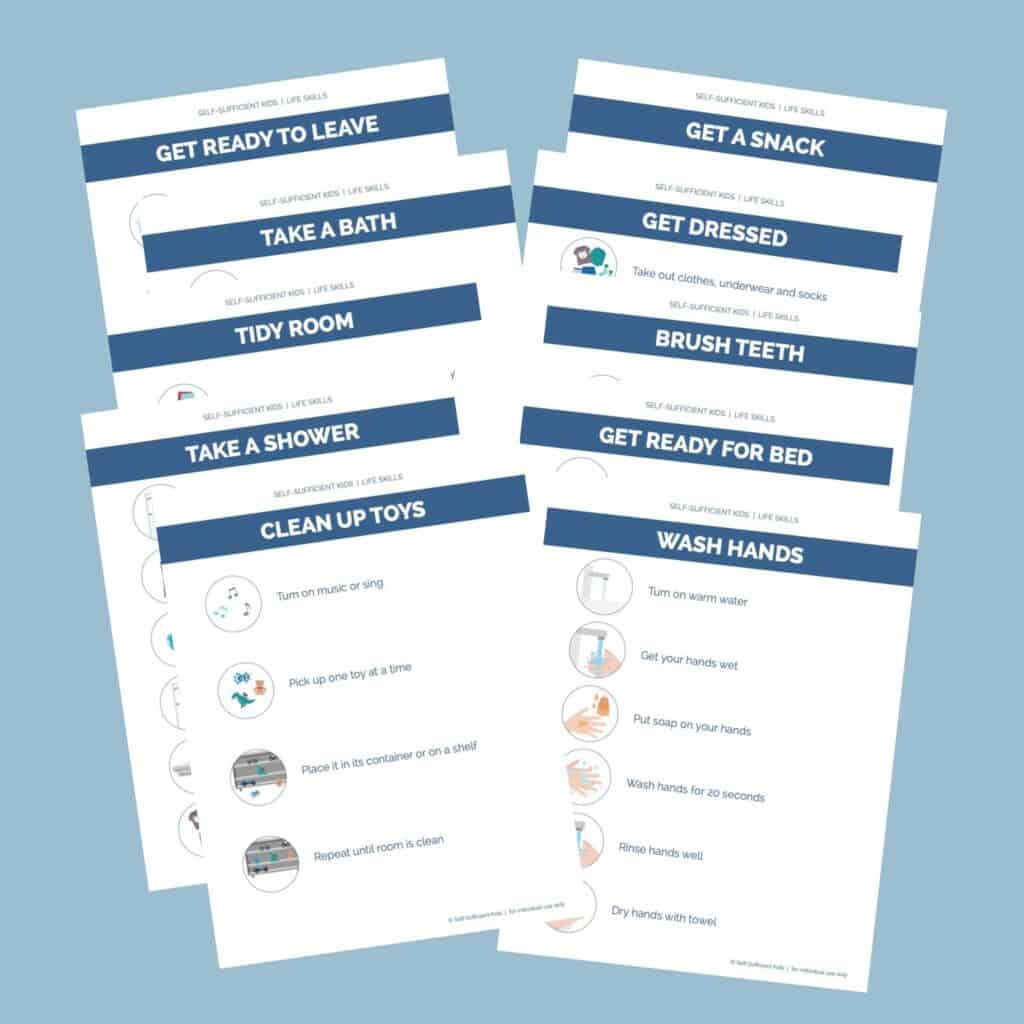9 Ways to Encourage Self-Sufficiency in Young Kids
Are you eager to have your young kids do more for themselves? Here are nine ways to encourage and raise self-sufficient kids.

Is there anything more agonizing than running late for work and watching your 4-year-old try to tie his shoes?
One lace slips out of his hand as he S-L-O-W-L-Y tries to loop the other around. So he starts over again. And again. And again.
Torture.
Even if he’s successful in making a bow, it will likely fall out in approximately 48 seconds.
Putting you back to square one.
There comes a time in every parent’s experience where we want more than anything for our kids to be independent. For them to tie their own shoes, make their own breakfast or remember to change their underwear without a reminder.
Getting kids to the point of self-sufficiency can be challenging. We often find it’s easier to say: “I’ll do it!” and take over a task just so we can move on with our day.
But each time we take over for our kids, we’re robbing them of the chance to learn on their own.
So how can parents encourage young kids to be self-sufficient without pulling their hair out?
While some independence comes naturally for kids, other tasks require coaching. In order to make the transition from dependence to self-sufficiency smoother, here are a few tips to keep in mind:
Identify opportunities
Sometimes getting kids to be more self-sufficient simply requires parents to consider which tasks kids can begin doing on their own. Perhaps your child doesn’t actually need you to make her her breakfast anymore? Or she is at the point of being able to brush her own hair? Often we become so accustomed to doing things for our kids we forget to question whether they are developmentally ready to do them on their own.
Related: 18 Things 2-3 Year Olds Can Do On Their Own
Don’t overwhelm
Once you’ve identified a few tasks your child could begin to do on his own, introduce the concept of independence one task at a time. Having kids tackle too many new skills at once can be overwhelming and discouraging.
Consider which tasks are likely to be easiest for your young child to master and begin with those. Success builds self-esteem and will likely make your child more willing to take on more complex tasks later on.
Help guide your young child through everyday tasks with these Simple Directions for Young Children Cards. Each card serves as a reminder of how to carry out a task and allows children to eventually take on tasks independently. Click here to learn more.
Patience is a virtue
It can take an enormous amount of patience to stand back and let kids tackle tasks on their own. Even simple chores can take kids what seems like an eternity to finish.
But being willing to be patient in the moment, means down the road your child will be more capable and self-sufficient. And reaching this level of competency ultimately means less work for you and a greater sense of self-esteem and independence in your child.
Downsize
Sometimes chores are tricky for kids because the tools needed to complete the task aren’t made for small hands and bodies. This is where kid-sized tools can be handy, for example:
- small pitchers for little hands
- knives with a serrated edge
- kid-sized brooms and dustpans
- clothing that is easy for kids to put on and take off.
It’s worth it to consider if a task is really too difficult for your child or if they simply don’t have the right tools for them to be successful.
Related: 11 Tools That Turn Kids Into Confident Kitchen Helpers
Forget Perfection
Your kids will not clean up spilled milk as well as you do or make their beds to your level of perfection.
And that’s OK.
The first hurdle is for them to feel capable of doing these tasks on their own and taking on responsibility. Perfection can come later.
Bite Your Tongue
Critiquing the way your daughter picked up her room is only going to make her feel incapable of doing it on her own.
Instead, praise the effort first and then ask if she’d like a few pointers on how to make her bookshelf even neater. It’s tricky initially to hold back suggestions when you know a task can be done better, but restraint will help build your child’s confidence in the long run.
Remember, kids often have no context for what’s considered “good” or even “good enough”. Gently guiding them towards an understanding of doing a task well may take some time and coaching.
Raise helpers
Having kids take part in family chores not only builds their self-esteem but also encourages greater self-sufficiency.
If you’re ready to give your kids chores, click on the image below to learn more about my four lesson course.
Interested in getting your kids started on chores? My four-lesson course will teach you how to get started, avoid nagging & power struggles, and keep your kids motivated. Click here or the image below to learn more.

Visual reminders
Visual reminders can be a great way to let kids know what they need to do without having to nag them.
Some examples include:
- chore cards to remind kids which chores they need to do each day (pictures on these cards help pre-readers)
- routine cards to list every task that needs to be completed before leaving the house in the morning or the steps needed to get ready for bed at night
- room cleaning cards that explain how to clean a bathroom or living room properly (best for kids who can read)
Keep the end goal in mind
It can be tortuous to stand by as our children take forever to get dressed, brush their teeth or tie their shoes. Not to mention how imperfectly they clean up their toys or spilled juice.
But if we’re willing to invest a few minutes of time and let go of perfectionism, we’ll find that as our children get older they’re more capable, responsible, independent, and are inching closer towards self-sufficiency. Which benefits both them and us.
See related:
15 Life Skills Kids Need Before They Leave Home
Why Kids Need Chores to be Successful in Life
How to Raise Responsible Kids Who Want to Help
What to do next…
1. Subscribe to Self-Sufficient Kids’ email list.
Like what you read here and want to learn more? Every Thursday I’ll send you one parenting tip about raising self-sufficient kids and creating the peaceful relationship you yearn to have with your child. Click here to sign up.
2. Take one of my quizzes!
Find out if you’re raising a self-sufficient kid (click here) or if you’re doing too much for your kids (click here). At the end of each quiz, you’ll be asked to provide your email address to see the results.
3. Get your kids started on chores.
Learn how to get your child started on chores (& keep them motivated + avoid power struggles) by enrolling in my Get Your Kids Successfully Started on Chores course. Click here to learn more and sign up.

About Kerry Flatley
Hi! I’m Kerry, the mother of two girls and a certified parent educator. I believe it is possible for parents to have a supportive, loving, and warm relationship with their kids while raising them to be independent and ultimately self-sufficient. Over the years, I’ve read numerous books and articles that support this belief and I’ve put these ideas into practice with my own kids. Read more about me and Self-Sufficient Kids here.


